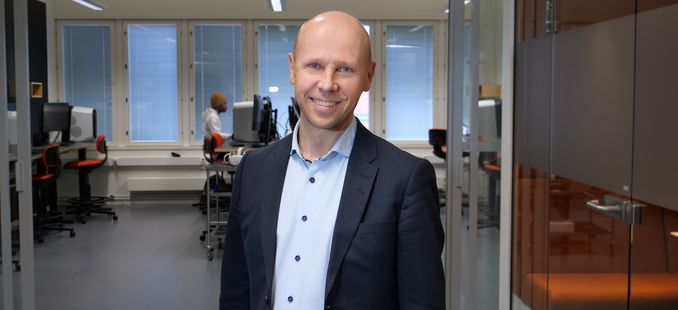
Innovative gaming technology and applied research
Mika Luimula, head of the Futuristic Interactive Technologies research group at Turku University of Applied Sciences, was appointed Executive Lecturer at the beginning of August. With the appointment, Luimula will be able to to focus even more strongly on research and the commercialization of ideas.
Text and image: Siiri Welling
If Mika Luimula's supervisor in university’s advanced research studies had not asked what he would do after the research, Luimula's career could be quite different.
However, the supervisor’s words made Luimula think about his future, and the advanced research had attracted interest in continuing the work and seeing what the field of technology could offer for him.
During the early 1990s, Luimula, who started his career at Ylivieska, first worked as a teacher of mathematics at the University of Applied Sciences and later as a Senior Lecturer of Information Technology at Centria University of Applied Sciences. After completing his Master's degree, Luimula started pursuing a doctoral degree in computer science. His aim has always been to carry out prototypes and practical experiments, even in challenging environments.
"For example, in 2006, Centria was still conducting the positioning of miners in the deepest mine in Europe with a depth of about 1300 metres. In such a deep mine, GPS no longer works, so we used the advanced technology of that time, WLAN positioning."
From the position of Senior Lecturer in Information Technology, Luimula became a researcher and project manager for various RDI projects. The title changed to a development manager and, after his dissertation in 2010, a research leader.
"Of course, the research focus has changed since then. Now, the rising metaverse, which is at the heart of our research activities, emerged as a promising technology trend on the research company Gartner's forecast curve last year. It is very interesting to follow Gartner's forecasts from a longer time perspective. For example, in 2006, the same curve will include a more robust reality, even after more than 15 years."
Harnessing game technology for other areas of life
In 2012, Luimula saw the position of a Principal Lecturer in gaming technology open at the Turku University of Applied Sciences. Finnish gaming research and gaming technology were tremendously on the rise to the 2010s, and many gaming companies forged hard profits, for example. For example, in 2009 the game company Rovio had released its very popular Angry Birds game, and Supercell, founded in 2010, followed tightly after. In 2012, the top three games in the App Store were provided either by Rovio or Supercell.
"The games industry seemed interesting, although I had not developed games in the past. Especially in the early stages, I strive to participate actively in various games industry events due to networking and understanding the special features of the games industry in Turku. I was lucky because the university of applied sciences had a project base in the field and skilled colleagues around me. When I came, I knew that gaming technologies could be used in other sectors and that this would probably be the main aim of mine to achieve. On the other hand, I dreamed that I could help students in one way or another in developing their business activities", says Luimula.
Very soon, Luimula realised that there was a very limited number of gaming companies in Turku with which it would be possible to carry out extensive applied research. The limited number also meant that graduating students had to create alternative employment opportunities in one way or another. From the beginning, Luimula also sought to network with representatives from other sectors and collected understanding of how to create a game in Turku.
"Around 2012 or 2013, when we were running e.g., joint Game Cluster project with operators from Kotka, I met representatives of Nitro Games and their subsidiary Serious Games Finland. One of them threw out the idea that we at the Turku University of Applied Sciences would be interested in testing the Glider game they had developed, which had been developed in a modern way for the PC at the time using Microsoft's motion detection sensor Kinect. AMK had long had cooperation with Sendai National College of Technology and while visiting there I met Professor Satoshi Hongo and his student Akihito Nakai. I introduced them to the game in question and got Akihito interested in visiting our laboratory and testing the game in Japan ", says Luimula.
Kinect’s capability and usability as a gamepad were examined. The results were promising and later served as the basis for other game applications that utilize physiotherapy and health. For example, in 2022, Luimula and his research group were involved in the BEE project, which investigated the impact of gamified and motion-sensing training at home after joint replacement surgery on the ability to move, function and experience pain. In light of the results, gamified rehabilitation was more effective compared to regular training. The study was also chosen as the Sports Medicine Study of the Year.
Developer of Metaverse
Currently, Luimula's research group focuses on virtual training solutions and the development of metaverse technology. The coronavirus pandemic gave impetus to the research and development of virtual training. The research group's activities are applied. The main goal is to find interactive user interface solutions for new applications using the principles of user-centered design and rapid prototyping. Cooperation is carried out with key partners. The hard work has also yielded results in the sense that, for example, forklift worker training can currently be done in a metaverse environment. In addition, Luimula's research group is considering in the VTC project the possibility of other qualification training courses operating in a virtual operating environment and the effectiveness of virtual training in general.
"My work at Turku University of Applied Sciences is extremely interesting and inspiring. Sometimes I enjoy my work a little too much."
From the beginning of August, Luimula has one more title in his portfolio: He was appointed as an Executive Lecturer. He is honored by the appointment and thanks his research team and colleagues for the good cooperation. Work on solutions utilizing interactive technologies continues to be somewhat more ambitious.
"In the future, I definitely want to contribute to the commercial use of our innovations. In too many cases, ideas and prototypes are left in a drawer", Luimula concludes.
